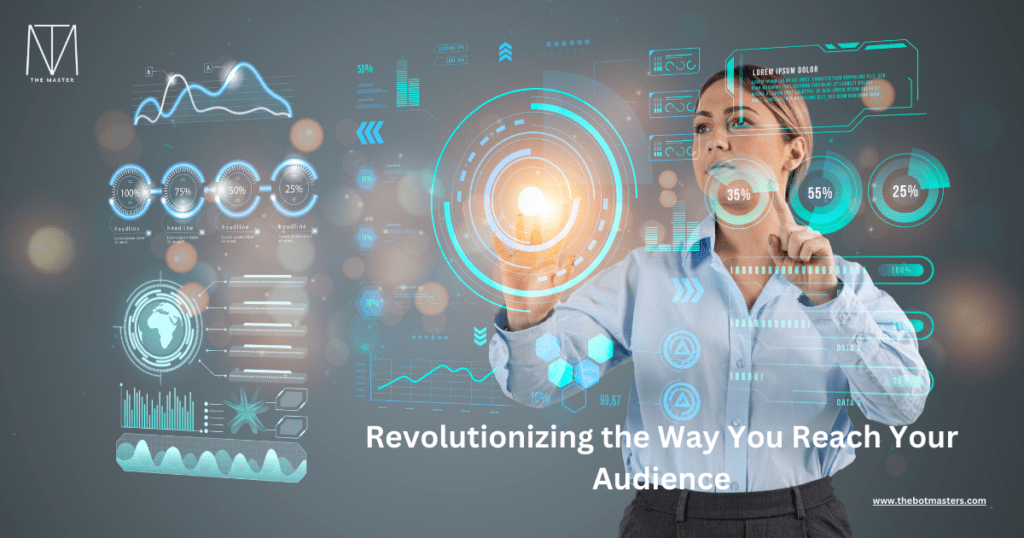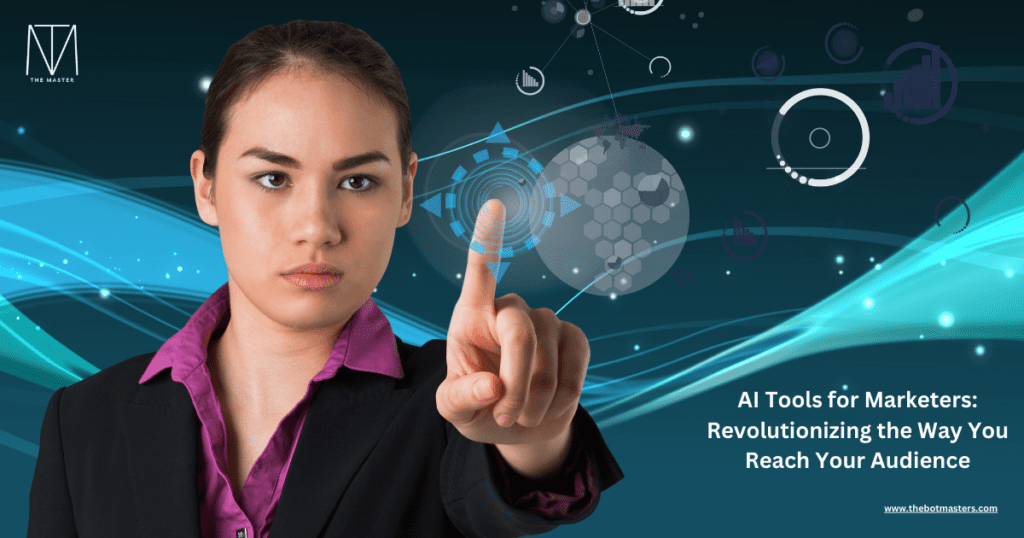AI Tools for Marketers: In the ever-evolving world of marketing, staying ahead of the curve is crucial. One of the most transformative developments in recent years has been the integration of artificial intelligence (AI) into marketing strategies. AI tools are reshaping the way businesses connect with their target audience, analyze data, and make informed decisions. In this article, we’ll delve into the world of AI for marketers, exploring essential tools that can take your marketing efforts to the next level.

Table of Contents
Understanding AI Tools for Marketers
Before we dive into specific AI tools, let’s clarify what AI is and how it’s applied in the marketing landscape. At its core, AI refers to machines or computer systems that can perform tasks that typically require human intelligence, such as problem-solving, learning from experience, and making decisions.
In marketing, AI is harnessed to automate processes, analyze vast amounts of data, and personalize interactions with customers. The benefits of AI in marketing are manifold, including improved efficiency, enhanced personalization, and data-driven decision-making.
AI-Powered Data Analytics
Data is the lifeblood of modern marketing. AI-driven data analytics tools can sift through massive datasets to extract valuable insights, enabling marketers to make informed decisions. Here are a few ways AI is transforming data analysis:
Customer Segmentation:
AI can identify distinct customer segments based on behavior, demographics, and preferences, helping marketers tailor their messaging for maximum impact.
Predictive Analytics:
Predictive models powered by AI can forecast future trends, customer behavior, and sales trends, allowing businesses to proactively adjust their strategies.
Dynamic Pricing:
Some AI tools enable dynamic pricing strategies based on real-time market conditions and customer behavior, optimizing revenue.
Popular AI analytics tools in this category include Google Analytics, Tableau, and HubSpot.
Chatbots and Virtual Assistants
Chatbots and virtual assistants are becoming ubiquitous in the digital marketing landscape. These AI-driven entities can engage with customers in real-time, answer inquiries, and guide users through various processes. Here’s how they’re changing the game:
Enhanced Customer Engagement:
Chatbots provide immediate responses to customer queries, boosting engagement and satisfaction.
24/7 Availability:
Virtual assistants are available round-the-clock, ensuring that customers receive assistance at any time.
Lead Generation:
Some chatbots can capture leads and direct potential customers to appropriate sales channels.
Notable platforms in this category include Intercom, Zendesk, and Drift.

Personalization and Recommendation Engines
AI algorithms are incredibly adept at personalizing content and product recommendations for individual users. This level of personalization can significantly boost customer satisfaction and conversion rates. Here’s how it works:
Behavior Analysis:
AI analyzes user behavior, past purchases, and browsing history to suggest products or content tailored to individual preferences.
Dynamic Content:
Websites and email campaigns can dynamically change based on user data, delivering highly relevant content.
Cross-selling and Upselling:
Recommendation engines can suggest complementary products, increasing the average transaction value.
Platforms like Amazon Personalize, Netflix’s recommendation engine, and Dynamic Yield are leading the charge in personalization.
Natural Language Processing (NLP)
The interplay between computers and human language is the focus of the branch of AI known as natural language processing. It’s a powerful tool in marketing for various purposes:
Sentiment Analysis:
NLP algorithms can analyze social media and customer reviews to gauge sentiment, helping businesses understand public perception.
Content Creation:
Some AI tools can generate written content, making content creation more efficient.
Chatbot Interactions:
NLP enables chatbots to understand and respond to natural language queries, improving user experiences.
Tools in this category include Hootsuite, Brandwatch, and Grammarly.
Marketing Automation with AI
Marketing automation platforms powered by AI can streamline repetitive tasks, such as email campaigns, social media posting, and lead nurturing. The benefits are substantial:
Efficiency:
Marketing teams can automate time-consuming tasks, freeing up resources for more strategic activities.
Personalization at Scale:
AI-driven marketing automation allows for personalized messaging to thousands of individuals simultaneously.
Data-Driven Decision-Making:
Automation tools can collect and analyze data on campaign performance, helping marketers refine their strategies.
Platforms like Mailchimp, Marketo, and HubSpot have incorporated AI into their automation offerings.
Image and Video Recognition
AI’s image and video recognition capabilities are a game-changer in marketing. These tools can analyze visual content for various marketing purposes:
Social Media Monitoring:
AI can scan images and videos across social media platforms to identify brand mentions and trends.
Ad Targeting:
Marketers can use AI to target specific demographics based on image analysis.
User-Generated Content:
AI tools can identify and curate user-generated content that aligns with brand messaging.
Prominent tools in this category include Google Vision AI, Clarifai, and Adobe Sensei.
Predictive Analytics for Lead Generation
Lead generation is a vital component of marketing, and AI has revolutionized this process by predicting potential leads and customer behavior:
Lead Scoring:
AI algorithms assign scores to leads based on their likelihood to convert, enabling sales teams to prioritize outreach.
Behavior Analysis:
AI tracks user behavior on websites and other touchpoints, identifying potential leads before they even make contact.
Lead Nurturing:
AI can automate lead nurturing workflows, sending targeted content to nurture leads through the sales funnel.
Tools like Leadfeeder, Infer, and InsideSales excel in predictive analytics for lead generation.
A/B Testing and Optimization
AI tools are making A/B testing and optimization more effective and efficient. These tools enable marketers to continuously test and refine their campaigns:
Real-time Optimization:
AI can adjust campaign elements in real-time, such as ad copy and design, to maximize performance.
Conversion Rate Optimization:
Marketers can use AI to identify factors that contribute to higher conversion rates.
Multivariate Testing:
AI-powered tools can handle complex multivariate testing, providing insights into various combinations of campaign elements.
Platforms like Optimizely, Google Optimize, and VWO (Visual Website Optimizer) offer robust A/B testing and optimization solutions.
Ethical Considerations
As we embrace the power of AI in marketing, it’s essential to acknowledge the ethical considerations and responsibilities that come with it. Here are some key points to consider:
Privacy:
Marketers must ensure they handle customer data with care, respecting privacy and following data protection regulations.
Bias:
AI algorithms can perpetuate biases present in data. It’s crucial to actively mitigate bias in AI systems to ensure fair and inclusive marketing practices.
Transparency:
Transparency in AI-driven marketing is essential. Be open about the use of AI tools, especially when it comes to customer interactions.
Accountability:
Marketers should take responsibility for the actions of AI systems they deploy, even if those actions are automated.
Conclusion
In the fast-paced world of marketing, AI is more than just a buzzword; it’s a transformative force that can’t be ignored. From data analytics to personalization, chatbots to lead generation, AI tools are revolutionizing the way businesses connect with their audience and drive results.
FAQs
AI in marketing refers to the use of machine learning and data analysis to automate processes, personalize marketing efforts, and make data-driven decisions. It’s important because it enhances efficiency, improves personalization, and helps marketers stay competitive in a data-driven landscape.
AI-powered data analytics can benefit marketers by providing insights into customer behavior, enabling predictive analytics, and optimizing marketing strategies for better ROI.
Some popular AI analytics tools for marketers include Google Analytics, Tableau, and HubSpot.
Chatbots and virtual assistants enhance customer engagement by providing immediate responses to inquiries, being available 24/7, and capturing potential leads through interactions.
Personalization and recommendation engines improve customer satisfaction, boost conversion rates, and increase average transaction values by tailoring content and product recommendations to individual preferences.
Examples of AI-driven content creation tools include GPT-3-based platforms like OpenAI’s ChatGPT and tools like Grammarly.
Marketing automation platforms with AI features improve marketing strategies by automating repetitive tasks, enabling personalization at scale, and providing data-driven insights for better decision-making.
Image and video recognition in marketing involves using AI to analyze visual content for purposes such as social media monitoring, ad targeting, and curating user-generated content.
Lead scoring is the process of assigning scores to leads based on their likelihood to convert. AI helps in lead generation by predicting potential leads and automating lead nurturing workflows.
A/B testing and optimization with AI make marketing campaigns more effective by allowing real-time adjustments, optimizing conversion rates, and handling complex multivariate testing.
Marketers should consider privacy, bias mitigation, transparency, and accountability when using AI tools to ensure ethical and responsible marketing practices.
Businesses can get started with AI tools in marketing by identifying their specific needs, exploring AI solutions, and investing in staff training or consulting with experts.
Read More…
AI in Healthcare: 7 Key Innovations Transforming Medicine
AI Tools for Businesses: Enhancing Efficiency and Growth
The Future of Technology: Exploring Wearable AI Tech
Exploring the World of Smart Home Devices: A Comprehensive Guide
An Introduction to AI Tools: Unlocking the Power of Artificial Intelligence
How to Guide for Important AI Tools
“Discover AI Tools on Amazon”
If you’re interested in exploring AI tools for Marketers, you can find a wide range of options on Amazon. From smart devices to data analytics software, Amazon offers a selection of AI solutions that can help your business thrive. Explore AI tools on Amazon today to stay ahead in the digital age.
Please note that if you decide to make a purchase through this link, I may earn a small commission at no additional cost to you.
“Thank you for your support!”
